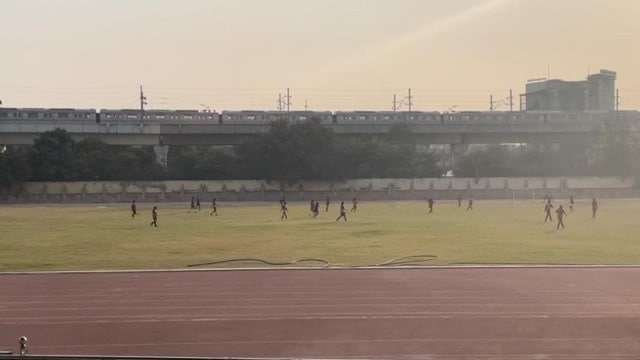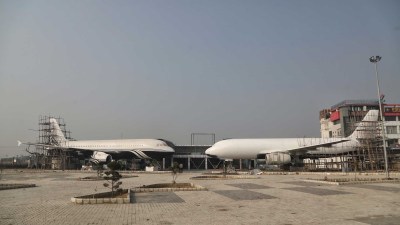‘Forced to choose between health and what she loves’: Why 11 Delhi students moved court to defer sports events in pollution season
Pediatric studies have repeatedly shown that prolonged exposure to high particulate matter can impair lung growth, reduce immunity and worsen asthma
 The Delhi team selection for the SGFI nationals in progress at the East Vinod Nagar sports complex in heavy smog in December 2023. A group of 11 schoolchildren have sought the Delhi High Court's intervention to change the outdoor sports calendar in the season of high air pollution. (Express)
The Delhi team selection for the SGFI nationals in progress at the East Vinod Nagar sports complex in heavy smog in December 2023. A group of 11 schoolchildren have sought the Delhi High Court's intervention to change the outdoor sports calendar in the season of high air pollution. (Express) On a November morning, a week after Diwali, Mehboob Shaw’s daughter, a Class 11 student, stepped onto a football field in Delhi as the Air Quality Index hovered in the ‘severe’ category — a range which prompts public health advisories to warn even healthy adults to stay indoors. By the time the inter-zonal tournament ended, she had done what many children in Delhi have been doing: breathe in toxic air.
Days later, she was coughing persistently and struggling to breathe. Nearly every student who played that day, parents say, came home with similar complaints.
Her experience is not an outlier, but part of a pattern that parents and pediatricians in the Capital have been warning about for years: children getting visibly sicker following outdoor sporting events held during the months when the city’s air routinely ranks among India’s most polluted.
Now, a group of children has taken their fight to the Delhi High Court, asking officials to reschedule their schools’ sports events during the months when the city’s pollution reaches its peak.
Their petition argues that scheduling school sports tournaments when the air is hazardous effectively forces students to choose “between their fundamental right to life and education”. Most major events are slated between October and January, a stretch marked by a recurrent cycle of toxic air.
The petitioners maintained that the health risks have become too acute to ignore.
Parents of these petitioners told The Indian Express that it is now a cycle so “consistent” that it has become “predictable”.
“Children return with watery eyes, asthmatic symptoms, itchy skin,” said Vasant Vihar resident Vidyut Gulati, the mother of a petitioner. “Headaches have become routine because of the pollution.”
Physical symptoms are only one part of the story. Parents say the very rhythm of childhood is changing.
“They are restless, anxious, agitated, wanting to go out. But they can’t,” said a parent of another petitioner. Another said her child now feels forced to choose “between her health and the sports she loves”.
For younger children, the stakes are even higher. “Their lungs have not developed, their immunity has not developed,” one mother said. Even teenagers, she noted, do not have fully mature lungs, making prolonged exposure particularly harmful. “It is really a silent killer and it is becoming true of Delhi.”
Pediatric studies have repeatedly shown that prolonged exposure to high particulate matter can impair lung growth, reduce immunity and worsen asthma. A 2021 study by AIIMS Delhi, Kalawati Saran Children’s Hospital and the Vallabhbhai Patel Chest Institute found that even short-term exposure to polluted air led to a marked rise in emergency room visits by children for acute respiratory symptoms, both on the day of exposure and for up to six days afterward. The researchers reported significantly higher cases on days with poor air quality compared with cleaner ones.
The parents said they see these effects playing out in real time. Some have begun questioning whether Delhi is still a viable place to raise children.
“I don’t know whether it’s worth living in the city at this time,” Shaw, a resident of Sainik Farm, said.
For many families, the struggle is not new, and the new legal battle keeps bringing old fears back. “I still remember going to Jantar Mantar eight years ago with my son, who was six or seven then, for a march against the poor air quality. But nothing has changed,” said Gaurav Gulati, whose child has moved the HC.
According to these parents, they moved the court out of desperation as these health episodes have only become more frequent.
This fall, Gaurav’s 15-year-old son, Abhiveer, was forced to visit a doctor after repeated coughing and wheezing fits following cricket practice. “The doctor said it was a bronchitis attack; his chest was congested and he had a headache. He had to miss school for a week and was told to stay indoors,” said his mother, Vidyut.
For the parents, moments like these sharpen the urgency of their case. Every practice session, they said, is another reminder of why the fight cannot wait another season.
Rahul Bose, whose daughter is a petitioner, said the emotional toll is mounting. “It’s not fair to make children choose between the right to live and the right to the opportunities in front of them,” he said.







